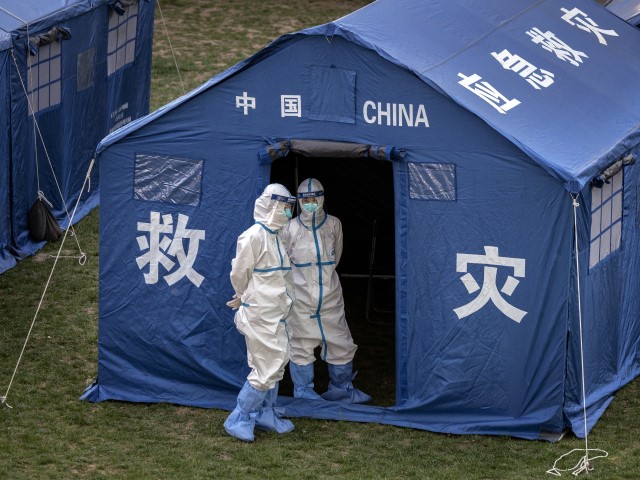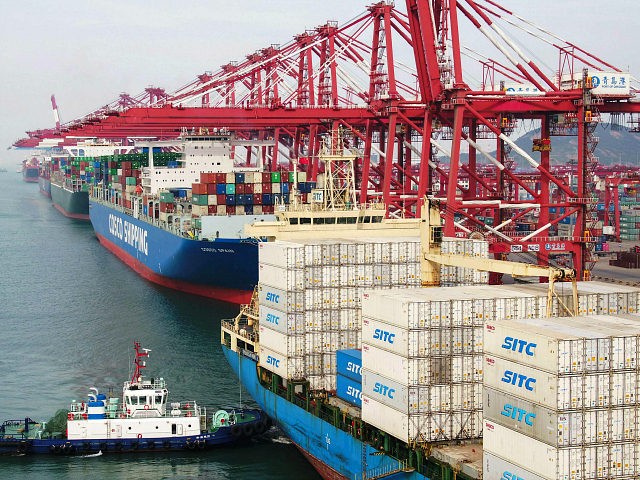Chinese customs data for October released on Monday revealed a surprisingly steep drop in both imports and exports, the latter contracting for the first time since the early days of the Wuhan coronavirus pandemic in 2020. Analysts said China’s ongoing coronavirus lockdowns, combined with a worldwide economic slowdown and disruptions from the Russian invasion of Ukraine, contributed to the dismal numbers.
Reuters thought the numbers from October might be “bleak” enough to cause some political trouble for the Chinese Communist Party, which refuses to admit its “zero-Covid” lockdown policy is a mistake, even as the rest of the world moves on from the pandemic:
Outbound shipments in October shrank 0.3% from a year earlier, a sharp turnaround from a 5.7% gain in September, official data showed on Monday, and well below analysts’ expectations for a 4.3% increase. It was the worst performance since May 2020.
The data suggests demand remains frail overall, and analysts warn of further gloom for exporters over the coming quarters, heaping more pressure on the country’s manufacturing sector and the world’s second-biggest economy grappling with persistent COVID-19 curbs and protracted property weakness.
Chinese exporters weren’t even able to capitalize on a prolonged weakening in the yuan currency since April and the key year-end shopping season, underlining the broadening strains for consumers and businesses worldwide.
CNBC noted China’s exports to the United States fell by 12.6 percent year-on-year in October, while the European Union was down nine percent, while China’s shipments to the Association of Southeast Asian Nations (ASEAN) actually increased 20 percent in October. This prompted speculation that high inflation and recessionary economies in the West are greatly reducing demand for Chinese exports.
“Other bellwether exporters in Asia, such as South Korea and Taiwan, have also reported faltering overseas sales, pointing to a broad slowdown in trade as the global economy loses momentum,” the Wall Street Journal (WSJ) noted.

Health workers wear protective suits as they stand outside a tent while waiting to perform nucleic acid tests to detect COVID-19 on local workers at a makeshift testing site in Haidian District on April 26, 2022, in Beijing, China. (Kevin Frayer/Getty Images)
“Lockdowns have hurt economic activity throughout the year, and the threat of further measures to snuff out even the tiniest Covid-19 outbreaks means consumers are reluctant to spend and businesses hesitant to invest, compounding the drag from a deflating property bubble,” the WSJ added.
An especially noteworthy lockdown-related export crisis is the Foxconn plant in Zhengzhou, the largest factory in the world for assembling Apple iPhones. Factory workers have been climbing over fences and fleeing home to remote villages on foot to escape a coronavirus lockdown imposed on the facility.
Escapees from the Foxconn facility told the Hong Kong Free Press (HKFP) in weekend interviews that they fled hideous lockdown conditions, including shortages of food and medicine, “quarantine” that felt more like imprisonment, and piles of uncollected garbage littering the plant. A common fear was that healthy people would be locked up in dormitories with the infected, rapidly spreading coronavirus infections.
Apple announced on Monday that it expects “lower iPhone 14 Pro and iPhone 14 Pro Max shipments than we previously anticipated,” so customers will “experience longer wait times to receive their new products.” On Sunday, Foxconn kicked off its latest recruitment drive, offering higher salaries and bonuses to fleeing workers if they return to the factory.
Meanwhile, imports declined 0.7 percent instead of growing by 0.1 percent as expected, a disappointment market analysts attributed to the coronavirus lockdowns, slumping property markets, and possibly some apprehension about dictator Xi Jinping’s unprecedented third term as leader of the Chinese Communist Party.

COMMENTS
Please let us know if you're having issues with commenting.